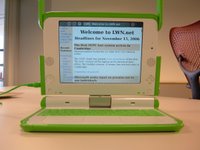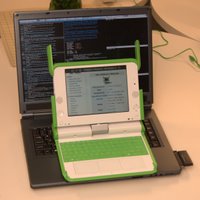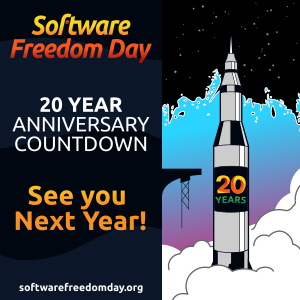Unlike previous generations (which used laptop-like Intel Atom or Celeron CPUs), this Chromebook uses a mobile phone-class Exynos processor. It's easy to load too many tabs and apps at first, but the system quickly slows down to remind you that this is a simple device, intended to be used simply. The payoff for this processor is improved battery life-- I have been getting more than 7 hours per charge.
With it's limits in mind, the device works well for browsing the web, writing emails, and using web apps. Patrons can sign on to the devices with their Google accounts (bringing up their Gmail, and Google apps, docs, and calendars), or can "browse as guests" anonymously.
The chicklet-type keys have good play and are easy to type with. Keys for controlling screen brightness and speaker volume are placed similarly with the same keys on the OLPC XO! They even use similar symbols. In fact, you might place the XO and the Chromebook on the same evolutionary line of Linux laptops, all using lightweight power saving hardware and simplified user experiences and designed for specific users (students, web surfers). The touchpad works without any drama, and the camera is good enough for video chats. The Chromebook looks inexpensive, but not cheap. It does not seem to be as durable as the rugged little XO, which was designed to be dropped by little hands, but everything worked out of the box and nothing has broken so far, although I'm not planning any drop tests!
The device works well as an ebook reader for purchased (or free) ebooks (using web-based apps like Google Play, Nook for Web and Kindle Cloud). Ironically, the most closed-in system for checking out ebooks from libraries is the one that works best with the Chromebook: Kindle ebooks checked out from libraries through Overdrive are readable with Kindle Cloud Reader since all the DRM is handled through Amazon. There is no Overdrive Media Console for Chrome. I plan on further testing of other systems for a later post
For years I've hoped that thin client technology would improve to the point where libraries could swap out our usual array of MS Windows-based PCs for something far cheaper to buy and maintain. The "Personal Computer" was always way too personalizable for efficient use in libraries. Tremendous, and tremendously expensive effort has gone into locking down these things for use by library patrons.
Thin clients, which pull user profiles and programs from servers, have always made more sense to me for patron use. But the user experience has always been lacking, and patrons were too wedded to Microsoft Office for it to be feasible. This newest Chromebook, however, could meet the needs of a lot of patrons for a simple web device, and online apps are a lot more acceptable. The price is right, and I know many libraries are evaluating Chromebooks. With luck, we may be moving into the "post public PC" era in libraries.








